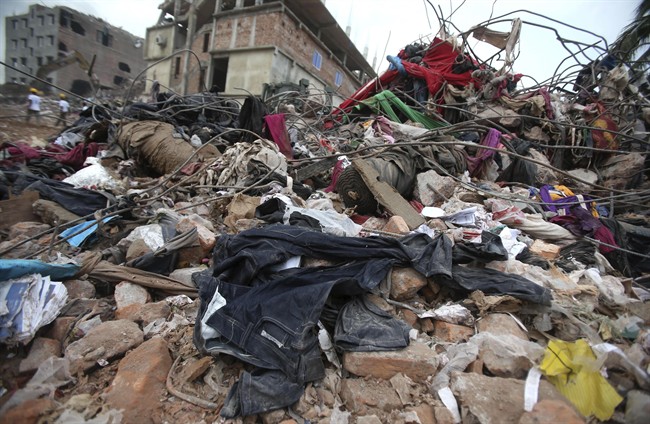TORONTO – Seeing images emerge from the world’s worst garment industry accident hit Laura Siegel hard – then led her to take action.

The award-winning Canadian designer has partnered with artisans in India on Project Eleven27, creating a collection of 1,127 scarves – one for each victim of the fatal building collapse in Bangladesh.
The April 24, 2013 tragedy at the illegally constructed Rana Plaza brought worldwide attention to the poor conditions endured by workers and renewed focus on the production practices used to create affordable goods.
“Being overseas and having visited a ton of factories at all different levels, I understand how that happened. And it was just sad because I felt that like it’s something that almost could have been prevented if something was just done about it,” said Siegel in an interview at the Toronto Fashion Incubator, a non-profit, small business centre that offers support and mentorship to budding homegrown designers and entrepreneurs.
READ MORE: Thousands mourn 1,127 people killed in Bangladesh factory collapse
“Unfortunately, that’s how many factories are run all over the world, so this honestly could happen again any time at any moment – maybe not in Bangladesh, maybe in another country.
- What is a halal mortgage? How interest-free home financing works in Canada
- Ontario doctors offer solutions to help address shortage of family physicians
- Capital gains changes are ‘really fair,’ Freeland says, as doctors cry foul
- LGBTQ2 rallies will be held across Canada next month. Here’s what to know
“It was kind of a little bit of a wake-up call. You’ve just got to try to do something. I’m only one person… everybody probably felt that way. What can we do now? How can this not happen again given what the manufacturing standards are like these days?”
Siegel, 26, spent a lot of time when she was younger travelling to developing countries, and has had the opportunity to do knitwear while in Peru and Bolivia where she learned of the passion for craft among the artisans.
“When I met individuals that were sustaining their culture that probably existed exactly the same way 1,000 years ago, (it) is just such a rare special moment,” she said. “So I wanted to figure out a way for them to be able to continue to sustain what they’re doing, but also to be able to continue relationships and connections with these people while designing – doing what I love – and supporting what they do.”
To that end, Siegel’s ready-to-wear womenswear label collaborates with artisans in rural villages around the world to help sustain craft – also a primary focus of Project Eleven27.
For the initiative, recycled saris sourced in Kutch, India, are laser-cut in Delhi and made into a yarn that’s brought back to Kutch. Namori Vankar and his family then weave the brightly coloured saris into the scarves which are a 50 per cent cotton, 50 per cent silk blend.
“Being able to sustain their craft, being able to continue their work is very special, especially in that region where a lot of people are forced to leave something that they’ve been practising in their families for so many centuries,” said Siegel.
In sourcing recycled saris specifically for the collection, they’ve tried to settle on a particular colour range – but each item remains distinct. “Every piece is different from the next.”
The 22-inch scarf retails for $135, while the 38-inch scarf – which can double as a sarong or wrap – sells for $195. The scarves will be available through Siegel’s online boutique, luxury retailer Holt Renfrew, and online retailers Shop Latitude and Shop Ethica.
Project Eleven27 will be donating 25 per cent of proceeds to Sreepur Village, an organization in Bangladesh helping the families affected by the tragedy. To commemorate the one-year anniversary of the Rana Plaza disaster this Thursday, 40 per cent of sales of the scarves sold on that day will benefit the charity.
Siegel said she would like to the chance to visit Bangladesh herself, and said Project Eleven27 will live on beyond the first foray.
“It’s about creating awareness on alternatives in production in this industry and positive alternatives. So that’s something that’s definitely going to be ongoing,” she said.
“We’re not going to change everything in this first year. It’s definitely a long-term project.”


Comments